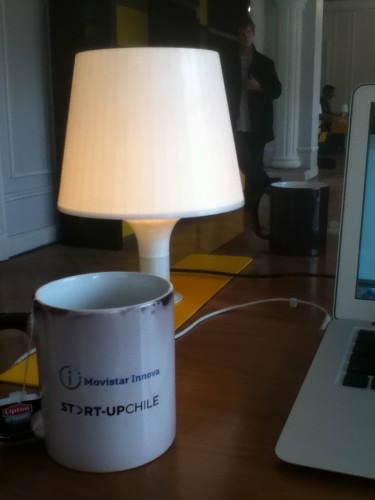How Start-Up Chile is Influencing Entrepreneurial Behavior in Chile and Beyond
Participating in Start-Up Chile has been one of the most inspiring and eye-opening experiences of my professional life. As part of a solar energy startup team, I participated in the program’s first generation in 2011.

 Participating in Start-Up Chile has been one of the most inspiring and eye-opening experiences of my professional life. As part of a solar energy startup team, I participated in the program’s first generation in 2011.
Participating in Start-Up Chile has been one of the most inspiring and eye-opening experiences of my professional life. As part of a solar energy startup team, I participated in the program’s first generation in 2011.
Start-Up Chile is an entrepreneurship initiative backed by Chile’s Ministry of Economy that invites entrepreneurs from all over the world to bootstrap their businesses in Chile, with the support of a $40,000 grant, a gorgeous office in central Santiago, and endless opportunities to network and collaborate with a dynamic community of entrepreneurs.
I stumbled across Michael Leatherbee and Charles E. Eesley’s academic study of the impact of this program, Boulevard of Broken Behaviors: Socio-Psychological Mechanisms of Entrepreneurial Policies and decided to share the most fascinating parts of this study with you (especially if you don’t have time to read all the methodological details and statistical regressions that led to these conclusions).
Leatherbee and Eesley’s study focuses on how Start-Up Chile is “changing the entrepreneurial environment by altering the sociological and psychological attributes of its participants.”
It focuses on two core aspects: Entrepreneurial Self-Efficacy (ESE) and Opportunity Discovering Behaviors (ODB).
Leatherbee and Eesley define Entrepreneurial Self-Efficacy in this way:
ESE is a measure of an individual’s belief in their abilities to perform entrepreneurial tasks successfully. Individuals with higher levels of ESE are more likely to pursue more audacious ventures.
The authors define Opportunity Discovering Behaviors like this:
ODB is a measure of the extent to which individuals behave in ways that favor the discovery of high-value, innovative entrepreneurial opportunities. Through the process of socialization (Berger & Luckmann, 1967), we argue that entrepreneurs assimilate those behaviors embedded in their social environments which are perceived as useful for the entrepreneurial process.
For the purposes of this paper, we call questioning, observing, experimenting and networking the opportunity discovery behaviors (ODB).
The study compares ESE and ODB of three groups: non-Chilean entrepreneurs that participated in Start-Up Chile, Chilean entrepreneurs that participated in the program, and Chilean entrepreneurs that applied but were not selected.
The results are striking:
The regression results suggest that domestic entrepreneurs who participated in the Start-Up Chile develop higher ODB than domestic entrepreneurs who did not participate in the program.
Moreover, it is striking to find that 45% of domestic entrepreneurs stated that peer learning was the most valuable aspect of the program. This difference stands in stark contrast when compared against the response of foreign participants. Of these only 16% considered peer learning a valuable aspect of the program. In other words, domestic entrepreneurs (who as a group have lower ODB and ESE than foreign entrepreneurs) are more likely than foreign entrepreneurs to perceive knowledge from their peers as a valuable resource that is being transferred through the public policy.
So yes, the program has been successful in increasing the entrepreneurial potential of its domestic participants.
A broader goal of Start-Up Chile is to strengthen Chile’s entrepreneurial ecosystem as a whole. I think this has been quite successful as well.
Following my participation in Start-Up Chile, I stayed in Chile to teach entrepreneurship classes at Chilean universities and collaborate with local entrepreneurs.
In Emprendimiento y Liderazgo, an entrepreneurship course for first-year students at the Universidad del Desarrollo, we specifically trained students in ODB. They worked in groups to discover opportunities and create prototypes of new toys to address problems they observed in the world around them. One group in my class noticed that mothers don’t exercise as much as they’d like, and they created a board game that involved push-ups, sit-ups, and jumping jacks for the whole family.
I think it’s important to train students in these behaviors, whether or not they immediately launch these ideas as actual businesses.
The paper also mentions the role of peers in the way people approach entrepreneurship.
Social comparison theory argues that when an individual comes to the realization that another person—who is similar to the former in some distinct way—can achieve something that is considered challenging, that individual starts believing that the challenge is more achievable than originally thought.
In other words, an initial perception that something is very difficult or impossible to achieve can be relaxed when individuals observe other similar individuals achieving that something.
I can definitely attest to this. I come from a family of entrepreneurs (my parents and brother have all run businesses, and have all participated in Start-Up Chile). Working alongside many entrepreneurs, both in Start-Up Chile and at Co-Work, has given me plenty of ideas for current and future endeavors.
I’m glad to see that Michael Leatherbee and Charles E. Eesley have emphasized the social and psychological aspects of entrepreneurial ecosystems (which is apparently unusual among academic studies on this topic) and I’m glad to see that Start-Up Chile is being recognized for its focus on peer learning and collaboration. Good work!
Here’s another link to the paper’s abstract. From this page you can download the whole paper.
Mike Leatherbee also wrote about the study in Spanish for El Mercurio, Chile’s leading newspaper.
This post originally appeared on LinkedIn.